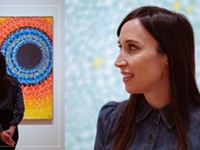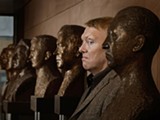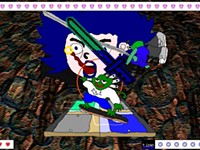Fools = gold
How an empathetic anarchist comedian is changing the world
By Rebecca Rafferty @rsrafferty[
{
"name": "500x250 Ad",
"insertPoint": "5",
"component": "15667920",
"parentWrapperClass": "",
"requiredCountToDisplay": "1"
}
]
The archetype of the fool is a complicated one, but we can learn a thing or two about the value of clowns from Shakespeare and rodeos. And apparently, from Iceland. Jón Gnarr is an anarchist comedian, actor, and artist who served as mayor of Reykjavík, the capital of Iceland. His forearm tattoos — Reykjavík's coat of arms and the logo of British anarchist punk band, Crass — reflect the paradox that he embodies. Notorious and beloved street artist, Banksy, gifted a painting to him. His fan club also includes Noam Chomsky and Lady Gaga. Clearly, this is no ordinary mayor.
On Thursday, April 23, Open Letter Books will bring Gnarr to Rochester for a book signing of his work, "The Indian," which was recently published in English. "The Indian" is part of a trilogy, followed by "The Pilot," which will be published in English in early 2016, and a third book, which Gnarr is currently writing. For more information about Gnarr's work and his visit to Rochester, check openletterbooks.org.
After Iceland's economy tanked in 2008, fear and anger dissolved into chaos. Gnarr and friends decided to get involved, creating the satirical "Best Party," which brought honesty, levity, and empathy to the political table. The party won the 2010 election, Gnarr became mayor of Iceland's capital, Reykjavík, and got the world's attention. Currently a writer in residence and guest lecturer at Rice University in Houston, Texas, Gnarr says he is retired from politics — though a hefty percentage of Icelandic voters are clamoring for him to run for president.
Through a series of anecdotes, "The Indian" — named for his youthful identification with the wild and unwanted Native Americans — is an intimate portrait of Gnarr's difficult childhood. An unplanned child of older parents, the precocious young Gnarr was more than a handful for his exasperated folks. This was compounded by his dyslexia and other learning disabilities and resultant behavioral issues, which rendered him classified as "mentally retarded" by archaic standards in child psychology. Through his innocent and searching voice, confusion and frustration are palpable, but it's punctuated by moments of blissful silliness as he overcomes obstacles.
City Newspaper recently spoke with Gnarr about his writing, about being an anarchist in public office, the value of communication and empathy, and his interest in climate change. Following is an edited version of the conversation.
City: Why did you decide to write this trilogy?
Jón Gnarr: I didn't really want to do it. A woman in Iceland approached me, she had heard me telling some of the stories on the radio, and she wanted me to write a book about them. I was honestly very reluctant to do it, but whenever I ran into her, she would mention the idea. And so I kind of promised her I would do it. It's in a way a therapy for me to write it. It's very personal, it's my past, and I'm forced to recall and remember things I'd rather not think about. So that's been hard, but also beneficial.
Have Iceland's philosophies of child behavioral studies changed?
In a way it is the same. People have a better understanding of the criteria of the disabilities that children are facing. There are names for it now, like ADHD, or Asperger's, but I am surprised by how little it has changed. There are so many children who are in very similar circumstances as I was as a child, and of course professionals have an understanding that is sometimes completely different from families and parents.
What affected me most was that my parents, and especially my father, suspected that I was, he called it "retarded." And many people in the family also thought so. For example with Asperger's, people assume even today it's just a fancy word for stupidity, or laziness, and something that you should be able to fix with willpower. That has encouraged me to write my book, to give people an insight into the mind and the feelings of a child in these circumstances.
There are some parallels between this book and your first one, "Gnarr! How I Became Mayor of a Large City in Iceland and Changed the World," in that our systems don't really allow for an empathetic understanding of one another. Were you surprised that the Best Party succeeded in winning the election?
To be honest, I was not. I was very sure that people would vote for us. There is one news interview with me very early on in the race — there was a poll that showed 0.7 percent support for the Best Party. In the interview I said, "This is just the beginning." I was very cocky, and the guy who was taking the interview chuckled, but I kind of knew it. While so many people were trying to find reasons to vote for the Best Party, I was thinking in the completely opposite way: I couldn't find any reason not to vote for the Best Party. It's been explained by many commentators and political scientists as some sort of a protest vote, but I'm not sure. I think most people voted for us because they like me and they trust me, and found this to be an interesting idea.
Have your anarchist ideologies been affected by your time as mayor?
Yes, of course, they have been challenged. I have had to really look closely at my philosophy and it becomes a paradox to try and be an anarchist. I described that in the next book, "The Pilot," which is all more or less about class and anarchism. I realized very early on in my job as mayor that the "important" role of politics in municipalities is very overrated. It is there, but it's not as important as people want it to be.
I've been asked, "Are you now a politician?" and, "How can you be an anarchist and a mayor?" I don't consider myself to be a politician. It was a job. It's more or less about making decisions based on common sense. I also feel that the role of politics is very overrated in our society. It has many of the same qualities as an addiction, or a religion. It's become so faith-based. Political leaders are promise-givers who promise a better life in the next life. And the next life starts the minute they get elected. That's when paradise comes. But paradise never comes. Somehow it's just part of the game. We all know they're going to betray us, and we accept it, and we still go on, because we want to believe it.
How has your work as mayor affected Iceland?
I think time will tell. I put an emphasis on different issues that I value to be important. For example, human rights issues and peace. Generally speaking, that is a way of introducing more empathy into politics, and that has had a real effect. I can see it. I even notice politicians using similar language as I used.
We tried to be role models, and are still waiting to see what it will inspire. We've seen movements like the Pirate Party in Parliament gaining popularity and success. In a way, it's inspired by the Best Party. There was a demand, when our term was coming to an end, for us to continue. But I didn't want to do it. By that, I felt like I was putting the pressure out there, on somebody else. I'm following it very closely; I'll be interested to see.
Polls showed that more than a third of voters want you to be elected as the next president, but you've said you're done. What would be a reason that you would run for president?
I don't like the political culture. For me, it's so false and so faith-based. If I was to go into office, it would have to be for some higher cause. It's not for me. It was never for me. It was my duty to do something, but at the same time I'm scared of it. I'm terrified of it. I try to hold my head up high, and be courageous, and step into something. For me, it was kind of like stepping into a party, turning down the music, communicating with intoxicated people, and asking them to leave. You don't want to do it, but you feel a responsibility, somebody has to talk to them, and get them out, before they burn down a house. That was how I felt. And that was how I pictured the politicians at the time, as intoxicated people. And I think some of them were intoxicated.
When I heard people were naming me, I was honored, but I don't want to do it. Except if there's a crisis or something. The current political situation in Iceland is quite embarrassing. It's gone from bad to worse. Parliament is more dysfunctional than ever. People voted for the two parties that were responsible for the economic crisis. Traits I hadn't noticed before are present: xenophobia, homophobia, nationalistic ideas. I find that very uncomfortable. I feel that aggression and despair is escalating. People are worried about their future, and have very little trust toward public institutions and politicians.
You've said you wanted to inspire more people to be more proactive about solving problems and not rely on politicians to solve everything, because they won't.
I think if we can make democratic participation more attractive, then we will get more people to participate in it. I try to encourage people who feel an interest in social issues to follow that feeling, and find a way to get involved. We need good people who care. We need to be open to new ideas and methods. The Best Party is apolitical in a sense, because it's a strategic philosophy more than political ideology.
Many people are claiming that some countries aren't even democratic anymore. For example, the United States. The only way is to step into it. When I started the Best Party, I never thought it would get any attention outside of Iceland. That was a surprise. But I'm glad it did.
How did your relationship with Rice University come about?
The international attention the Best Party brought us was mostly a sensational interest. "A comedian has been elected to office in Iceland!" But there was also professional and academic interest in the Best Party, and very clever and intellectual people were trying to understand it.
You're currently the first writer-in-residence at Rice's Center for Energy and Environmental Research in the Human Sciences, tasked with building a bridge between academia and the arts and media.
I have been, like so many other people, worried about climate change. What it is, and what we can do about it. How we can bring it into more public discussions and awareness. Often, the first reaction to bad news is denial. It's a bit like going to the doctor for the results of your test, and he tells you, "You know, you have to quit smoking, quit drinking, and stop eating meat." If these are the things you enjoy most in life, it can be pretty hard.
We have scientists who all agree that it's serious and we should do something about it, and then on the other hand we have politicians who are more skeptical. The Prime Minister of Iceland had a speech a few days ago, and mentioned global warming. He sees it as an opportunity for us, because the weather is going to get much better in Iceland, and we're going to grow all sorts of vegetables, and we're just gonna bathe in the sun. "God bless climate change."
I feel a responsibility to be part of that dialog.
Speaking of...
-

Nine new books we’re excited to read this fall
Sep 1, 2021 -

Holiday escapism
Nov 14, 2018 -

Rochester's role in translating worldwide women authors
Sep 12, 2018 - More »
Latest in Culture
More by Rebecca Rafferty
-

Beyond folklore
Apr 4, 2024 -

Partnership perks: Public Provisions @ Flour City Bread
Feb 24, 2024 -

Raison d’Art
Feb 19, 2024 - More »



